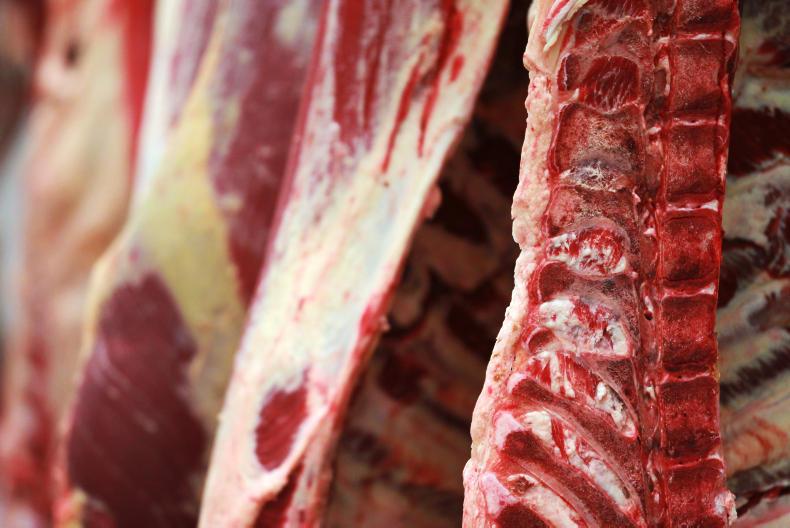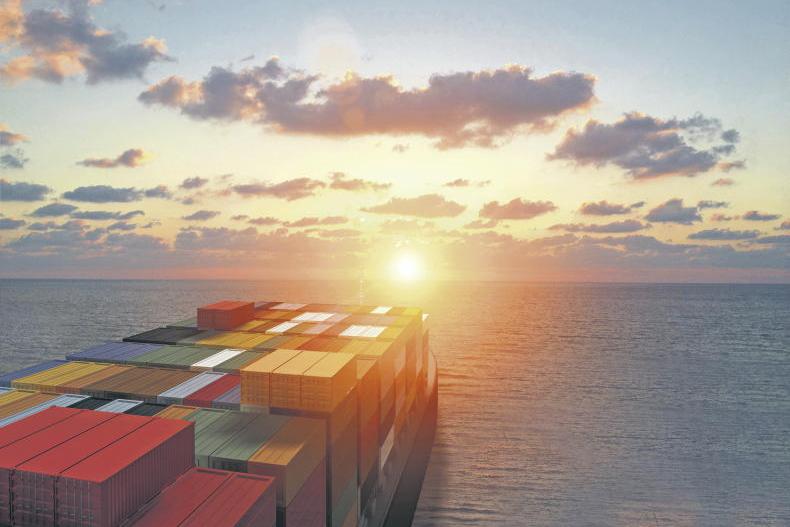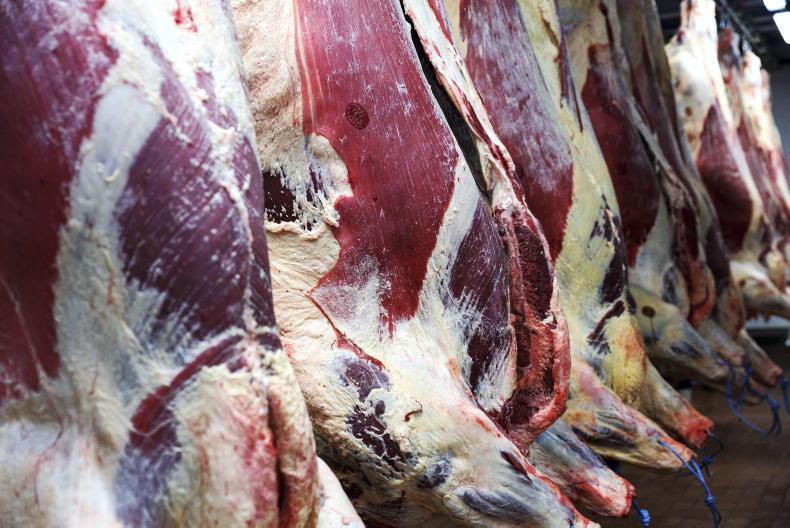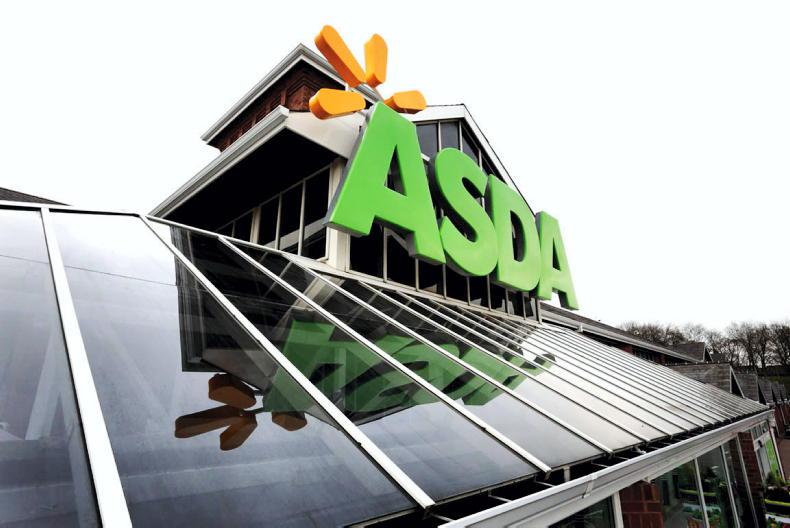Rumblings of discontent among British farmers about the beef price are not surprising, given that prices there have been on a similar downward spiral to what Irish farmers have experienced over recent months. In the midst of this crisis, there is again a focus on imports and their place in the UK supermarket trade – which inevitably puts the spotlight on Ireland.
According to AHDB, the English levy board, overall UK beef import volumes are down 13% to 143,900t up to the end of July, while the value was down 16% to £437.6m (€494m). Irish beef dominates UK imports, accounting for 77% of all beef imports at 111,262t – which is 7,000t less than for the same period to the end of July in 2018.
British and Irish mix
The top three UK supermarkets, Tesco, Sainsbury’s and Asda, all carry a mixed range of British and Irish meat, as do the major burger chain outlets. For them the product is interchangeable, though the majority is sourced from the UK.
According to the latest AHDB retail survey in August, Asda carried 67% British or UK-origin beef, Tesco was on 70% and Sainsbury’s on 89%.
While the survey doesn’t state where the non-UK beef is from, we can conclude that it is Ireland because of their purchasing policy.
All of the other top 10 retailers in the UK stock exclusively British beef.
Farmer unrest
With the British R3 steer price at the equivalent of €3.71/kg, farmers are looking closely at supermarket sourcing policy.
The threatened blockade of Irish imports at the port of Holyhead in Wales failed to materialise last week, and it did not have endorsement of the National Farmers Union (NFU) or the Farmers Union of Wales.
However, Irish beef is under the spotlight and with attention drawn to the €100m support fund to compensate for the price fall over the period between September 2018 and May this year.
EU beef labelling requires that the country of origin is carried as part of the label
The NFU and NFU Wales presidents met with the minster responsible for farming in the UK, George Eustice, this week and among the issues they raised was that “to increase transparency of product flows and the mixture of Irish and UK beef on retail shelves, government should insist on differentiation of barcodes”.
Of course EU beef labelling requires that the country of origin is carried as part of the label, but given that the product is considered interchangeable, it would require inspection of the label by consumers to determine where the beef in the pack came from. The NFU wants a clearer distinction.
Labelling
We also have a focus on product labelling in Irish supermarkets and this came to a head in a recent dispute when a batch was wrongly labelled, with the slaughter process appearing to have happened twice, once in Ireland and again in Northern Ireland.
In France supermarkets are terrified of incurring the anger of French farmers
It was identified as an error and the batch removed from sale, but Irish farmers expect Irish retailers to have Irish beef. In France supermarkets are terrified of incurring the anger of French farmers and it is now extremely rare to find a non-French label on beef for sale in supermarkets, whereas it was common a decade ago.
Farmers in Britain are in a bad place with prices just like their counterparts on this side of the Irish Sea and either side of the border.
However, the problem will not be solved by labels or putting a bigger flag on the meat packs, because irrespective of where they come from in the EU they are all produced to a similar standard.
The threat of a no-deal Brexit at the end of this month remains high and if the UK Government implements its stated policy of creating 230,000t tariff-free quota for beef open to all WTO countries then it will be beef from Brazil, where the farmgate price is the equivalent of €2.16/kg, that will depress markets even further.
Irish and British farmers should be on the same side
Given the hostility towards red meat there is a case for a combined British and Irish, if not wider EU, campaign by farmers and the industry to counteract the negative press the sector has experienced in recent times.
Irish and British farmers should be on the same side, not just because Ireland is the historical and obvious choice to supply the beef the UK doesn’t produce itself, but because the external challenges to beef are so great.
There is much more that unites farmers than divides, but that isn’t always obvious, particularly when there is a price crisis.
Read more
Welsh farmers plan to blockade trucks of ‘cheap’ Irish beef
Rumblings of discontent among British farmers about the beef price are not surprising, given that prices there have been on a similar downward spiral to what Irish farmers have experienced over recent months. In the midst of this crisis, there is again a focus on imports and their place in the UK supermarket trade – which inevitably puts the spotlight on Ireland.
According to AHDB, the English levy board, overall UK beef import volumes are down 13% to 143,900t up to the end of July, while the value was down 16% to £437.6m (€494m). Irish beef dominates UK imports, accounting for 77% of all beef imports at 111,262t – which is 7,000t less than for the same period to the end of July in 2018.
British and Irish mix
The top three UK supermarkets, Tesco, Sainsbury’s and Asda, all carry a mixed range of British and Irish meat, as do the major burger chain outlets. For them the product is interchangeable, though the majority is sourced from the UK.
According to the latest AHDB retail survey in August, Asda carried 67% British or UK-origin beef, Tesco was on 70% and Sainsbury’s on 89%.
While the survey doesn’t state where the non-UK beef is from, we can conclude that it is Ireland because of their purchasing policy.
All of the other top 10 retailers in the UK stock exclusively British beef.
Farmer unrest
With the British R3 steer price at the equivalent of €3.71/kg, farmers are looking closely at supermarket sourcing policy.
The threatened blockade of Irish imports at the port of Holyhead in Wales failed to materialise last week, and it did not have endorsement of the National Farmers Union (NFU) or the Farmers Union of Wales.
However, Irish beef is under the spotlight and with attention drawn to the €100m support fund to compensate for the price fall over the period between September 2018 and May this year.
EU beef labelling requires that the country of origin is carried as part of the label
The NFU and NFU Wales presidents met with the minster responsible for farming in the UK, George Eustice, this week and among the issues they raised was that “to increase transparency of product flows and the mixture of Irish and UK beef on retail shelves, government should insist on differentiation of barcodes”.
Of course EU beef labelling requires that the country of origin is carried as part of the label, but given that the product is considered interchangeable, it would require inspection of the label by consumers to determine where the beef in the pack came from. The NFU wants a clearer distinction.
Labelling
We also have a focus on product labelling in Irish supermarkets and this came to a head in a recent dispute when a batch was wrongly labelled, with the slaughter process appearing to have happened twice, once in Ireland and again in Northern Ireland.
In France supermarkets are terrified of incurring the anger of French farmers
It was identified as an error and the batch removed from sale, but Irish farmers expect Irish retailers to have Irish beef. In France supermarkets are terrified of incurring the anger of French farmers and it is now extremely rare to find a non-French label on beef for sale in supermarkets, whereas it was common a decade ago.
Farmers in Britain are in a bad place with prices just like their counterparts on this side of the Irish Sea and either side of the border.
However, the problem will not be solved by labels or putting a bigger flag on the meat packs, because irrespective of where they come from in the EU they are all produced to a similar standard.
The threat of a no-deal Brexit at the end of this month remains high and if the UK Government implements its stated policy of creating 230,000t tariff-free quota for beef open to all WTO countries then it will be beef from Brazil, where the farmgate price is the equivalent of €2.16/kg, that will depress markets even further.
Irish and British farmers should be on the same side
Given the hostility towards red meat there is a case for a combined British and Irish, if not wider EU, campaign by farmers and the industry to counteract the negative press the sector has experienced in recent times.
Irish and British farmers should be on the same side, not just because Ireland is the historical and obvious choice to supply the beef the UK doesn’t produce itself, but because the external challenges to beef are so great.
There is much more that unites farmers than divides, but that isn’t always obvious, particularly when there is a price crisis.
Read more
Welsh farmers plan to blockade trucks of ‘cheap’ Irish beef










SHARING OPTIONS